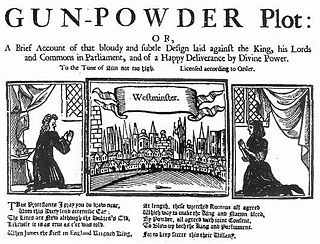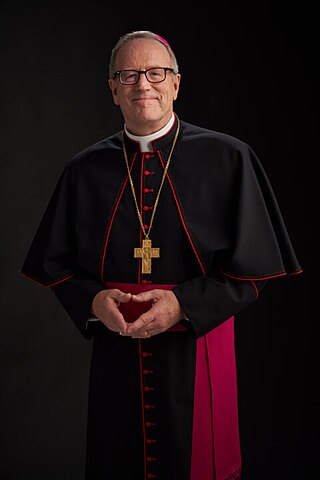Related Research Articles

Robert Bellarmine was an Italian Jesuit and a cardinal of the Catholic Church. He was canonized a saint in 1930 and named Doctor of the Church, one of only 37. He was one of the most important figures in the Counter-Reformation.

Elizabeth I was Queen of England and Ireland from 17 November 1558 until her death in 1603. She was the last monarch of the House of Tudor.

The Gunpowder Plot of 1605, in earlier centuries often called the Gunpowder Treason Plot or the Jesuit Treason, was an unsuccessful attempted regicide against King James I by a group of English Catholics led by Robert Catesby who considered their actions attempted tyrannicide and who sought regime change in England after decades of religious persecution.
Primate is a title or rank bestowed on some important archbishops in certain Christian churches. Depending on the particular tradition, it can denote either jurisdictional authority or (usually) ceremonial precedence.
The highest-ranking bishops in Eastern Orthodoxy, Oriental Orthodoxy, the Catholic Church, the Hussite Church, Church of the East, and some Independent Catholic Churches are termed patriarchs.

Beatification is a recognition accorded by the Catholic Church of a deceased person's entrance into Heaven and capacity to intercede on behalf of individuals who pray in their name. Beati is the plural form, referring to those who have undergone the process of beatification; they possess the title of "Blessed" before their names and are often referred to in English as "a Blessed" or, plurally, "Blesseds".
The advocatus diaboli is a former official position within the Catholic Church, the Promoter of the Faith: one who "argued against the canonization (sainthood) of a candidate to uncover any character flaws or misrepresentation of the evidence favoring canonization".

The Catholic Encyclopedia: An International Work of Reference on the Constitution, Doctrine, Discipline, and History of the Catholic Church, also referred to as the Old Catholic Encyclopedia and the Original Catholic Encyclopedia, is an English-language encyclopedia published in the United States designed to serve the Catholic Church. The first volume appeared in March 1907 and the last three volumes appeared in 1912, followed by a master index volume in 1914 and later supplementary volumes. It was designed "to give its readers full and authoritative information on the entire cycle of Catholic interests, action and doctrine".

The Catholic Church, also known as the Roman Catholic Church, is the largest Christian church, with 1.28 to 1.39 billion baptized Catholics worldwide as of 2024. It is among the world's oldest and largest international institutions and has played a prominent role in the history and development of Western civilization. The church consists of 24 sui iuris churches, including the Latin Church and 23 Eastern Catholic Churches, which comprise almost 3,500 dioceses and eparchies around the world. The pope, who is the bishop of Rome, is the chief pastor of the church. The Diocese of Rome, known as the Holy See, is the central governing authority of the church. The administrative body of the Holy See, the Roman Curia, has its principal offices in Vatican City, a small independent city-state and enclave within the Italian capital city of Rome, of which the pope is head of state.

The Ruthenian Greek Catholic Church, also known in the United States as the Byzantine Catholic Church, is a sui iuris (autonomous) Eastern Catholic church based in Eastern Europe and North America. As a particular church of the Catholic Church, it is in full communion with the Holy See. It uses the Byzantine Rite for its liturgies, laws, and cultural identity.
In a number of Christian traditions, including Orthodoxy, Catholicism, Lutheranism, and Anglicanism, a confessor is a priest who hears the confessions of penitents and pronounces absolution.

The Forty Martyrs of England and Wales or Cuthbert Mayne and Thirty-Nine Companion Martyrs are a group of Catholic, lay and religious, men and women, executed between 1535 and 1679 for treason and related offences under various laws enacted by Parliament during the English Reformation. The individuals listed range from Carthusian monks who in 1535 declined to accept Henry VIII's Act of Supremacy, to seminary priests who were caught up in the alleged Popish Plot against Charles II in 1679. Many were sentenced to death at show trials, or with no trial at all.
The National Catholic Reporter (NCR) is a progressive national newspaper in the United States that reports on issues related to the Catholic Church. Based in Kansas City, Missouri, NCR was founded by Robert Hoyt in 1964. Hoyt wanted to bring the professional standards of secular news reporting to the press that covers Catholic news, saying that "if the mayor of a city owned its only newspaper, its citizens will not learn what they need and deserve to know about its affairs". The publication, which operates outside the authority of the Catholic Church, is independently owned and governed by a lay board of directors.
Events from the year 1778 in Ireland.
A Catholic lay association, also referred to as Catholic Congress, is an association of lay Catholics aiming to discuss certain political or social issues from a Catholic perspective.
Confessor of the Faith is a title given by some Christian denominations. In Catholicism and Eastern Orthodoxy, Christians who professed their faith in times of Christian persecution and therefore had to suffer persecution, expulsion, torture, mutilation and imprisonment, but not directly undergo martyrdom, are called confessors. Later, popes, bishops, abbots, kings and hermits were also counted among the confessors.

Papal appointment was a medieval method of selecting the Pope. Popes have always been selected by a council of Church fathers; however, Papal selection before 1059 was often characterized by confirmation or nomination by secular European rulers or by the preceding pope. The later procedures of the Papal conclave are in large part designed to prohibit interference of secular rulers, which to some extent characterized the first millennium of the Roman Catholic Church, e. g. in practices such as the creation of crown-cardinals and the claimed but invalid jus exclusivae. Appointment may have taken several forms, with a variety of roles for the laity and civic leaders, Byzantine and Germanic emperors, and noble Roman families. The role of the election vis-a-vis the general population and the clergy was prone to vary considerably, with a nomination carrying weight that ranged from nearly determinative to merely suggestive, or as ratification of a concluded election.

Robert Emmet Barron is an American prelate of the Catholic Church who has served as bishop of the Diocese of Winona–Rochester since 2022. He is the founder of the Catholic ministerial organization Word on Fire, and was the host of Catholicism, a documentary TV series about Catholicism that aired on PBS. He served as rector at Mundelein Seminary from 2012 to 2015 and as auxiliary bishop for the Archdiocese of Los Angeles from 2015 to 2022.

The Order of Friars Minor is a mendicant Catholic religious order, founded in 1209 by Francis of Assisi. The order adheres to the teachings and spiritual disciplines of the founder and of his main associates and followers, such as Clare of Assisi, Anthony of Padua, and Elizabeth of Hungary, among many others. The Order of Friars Minor is the largest of the contemporary First Orders within the Franciscan movement.
References
- ↑ Herbermann, Charles, ed. (1913). . Catholic Encyclopedia . New York: Robert Appleton Company.